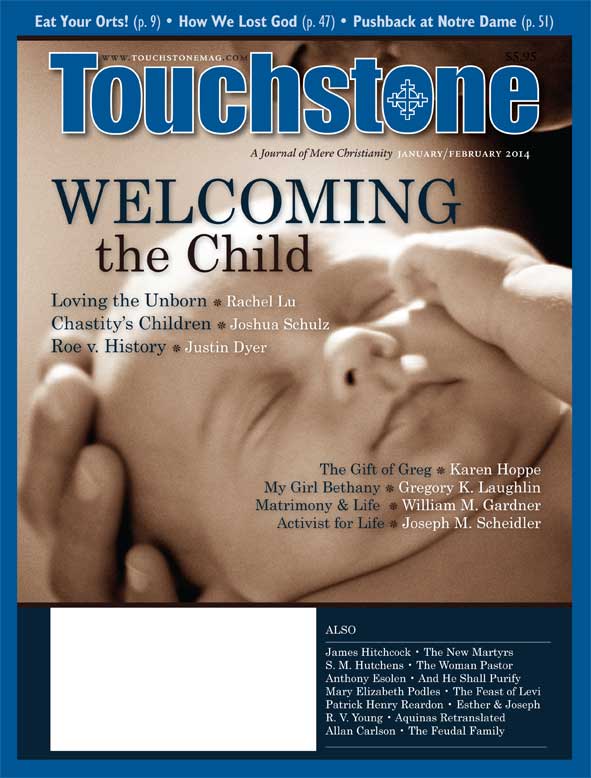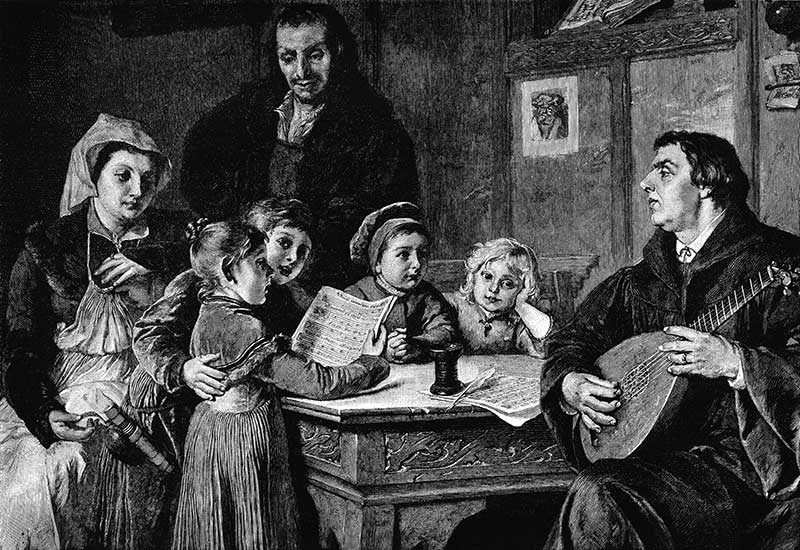VIEWS
Multiplication Tabled
William M. Gardner on the Problem of Preaching About "Responsible Parenthood"
Preaching at a wedding ceremony can be a great opportunity to impart sound catechesis on the essence and purpose of marriage. The opportunity can also be quite challenging, for the assembly often includes some older folks who have tragically and irreversibly bought into the mentality of the sexual revolution, and some younger folks who view the mention of children as a damper on the joy and excitement of the occasion.
Therefore, it is helpful to find explicit reference to the procreation and education of children in the prayers of the wedding service. For Catholics, for example, one of the prefaces of the Ritual Mass for the Celebration of Marriage contains a reference to the "chaste and fruitful love of holy Matrimony." This preface prayer precisely highlights the divine design of beautifying the world with children.
An insert to one of the Eucharistic Prayers has also been provided for use in the wedding Mass, which includes an entreaty to the Lord on behalf of the newlyweds to "gladden them with your gift of the children they desire." What a great moment to call down upon the newly married bride and groom the blessing of children—that is, at the solemn moment of Consecration.
But wait a minute! Is it merely the children "they desire" that we wish the married couple to be blessed with? Are any children beyond that number to be considered superfluous? Have Christians always and everywhere been known for accepting only the children they desire? Or has Christianity flourished, rather, when and where children were generously accepted even beyond the couple's desire or expectation?
Traditional Christian teaching had for centuries proposed and implied a single supernatural purpose to marriage and conjugal relations—namely, the procreation of children. But among modern Christians, a widespread shift from the traditional view has occurred, in favor of an emphasis on "responsible parenthood," which effectively affirms increased human control over the arrival of children within marriage. I fear that this shift has been deleterious to the exercise of vigorous Christian preaching on marriage and family life.

Responsible Parenthood
According to the Vatican II document Gaudium et Spes (1965), the exercise of "Christian responsibility" for parents
involves a consideration of their own good and the good of their children already born or yet to come, an ability to read the signs of the times and of their own situation on the material and spiritual level, and, finally, an estimation of the good of the family, of society, and of the Church. It is the married couple themselves who must in the last analysis arrive at these judgments before God. (#50)
In the same paragraph, mention is made of large families, but in a somewhat cautionary, apologetic tone: "Among married couples who thus fulfill their God-given mission, special mention should be made of those who, after prudent reflection and common decision, courageously undertake the proper upbringing of a large number of children."
The doctrine of the primacy of the procreative end of marriage and the subordination of conjugal love is implied, but not explicitly stated, in Gaudium et Spes, #48. Nevertheless, the essential importance of the procreative end is affirmed in the document, and traditional sources are referenced in the footnotes.
Pope Paul VI refrained from explicitly affirming the primacy of the procreative end of marriage in his landmark encyclical Humanae Vitae (HV, 1968). The term "responsible parenthood" makes its magisterial debut in this document, where the pope explains that "conjugal love requires in husband and wife an awareness of their mission of 'responsible parenthood,' which today is rightly much insisted upon, and which also must be exactly understood" (HV 10). While this exact understanding includes obedience to the moral order established by God for human sexuality, it also allows for consideration of the physical, economic, psychological, and social conditions that might warrant the temporary or indefinite avoidance of children.
Other Catholic documents that contain references to the concept of responsible parenthood are Pope John Paul II's Familiaris Consortio (1981; e.g., #29, 31, 32, and 33), the Catechism of the Catholic Church (#2368), and much Catholic literature that attempts to promote Natural Family Planning.
Allan Carlson, in his book Godly Seed (2012), tracks a similar trend among mainline Protestants and Evangelicals. Indeed, among the former, the shift in emphasis towards the concept of responsible parenthood predates that found in Catholic teaching during the last 40–50 years.
Secular Origin
Carlson makes the astonishing revelation in Godly Seed that the origin of the concept of responsible parenthood is not Christian. He reports that Planned Parenthood founder Margaret Sanger and her cohorts used the notion of family planning to counter opposition to birth control. At first, Carlson writes, Sanger was opposed to this marketing ploy, but she eventually acquiesced. The basic notion of family planning is that children who are conceived should be "wanted" children, hence "planned" children. Therefore, "birth spacing" was also promoted by early Planned Parenthood clinics.
Planned Parenthood's efforts were aimed at making contraception less objectionable to religious people (especially Catholics and Evangelical Christians). In other words, "responsible parenthood" was basically a marketing plan to co-opt religiously minded people into tolerating contraception by first getting them to accept family planning as responsible behavior.
According to Carlson, Karl Barth was a leading Protestant theologian who used the term "responsible parenthood." The term also appeared in the Anglican Lambeth Conference of 1958. Presumably, Karl Barth and Planned Parenthood would advocate very different approaches to family planning. But the term "responsible parenthood" seems to express the common denominator of a premise acceptable to them both: that responsible parents will plan their children's births carefully. This premise has been accepted by most Christians in the West today.
Now, to adopt something from the secular world and Christianize it certainly has precedent in the Christian tradition, and it can be felicitous (for example, the adoption of classical forms of architecture). But with a concept like family planning, which was used in its very origins to undermine traditional Christian teaching on marriage and family life, such adoption becomes problematic. It casts a shadow on the task of preaching genuinely responsible parenthood.
Overpopulation Motive
Recalling the satirical slogan coined by H. W. Crocker to describe natural family planning ("Use NFP, it doesn't work!"), we must admit that contemporary preaching does not seem to be in tune with the real sociological crisis facing Western civilization. The promotion of responsible parenthood was partly a response to the seeming problem of overpopulation. The fear was that the earth's resources would not suffice for the needs of the human race because the population was growing too fast. This fear has proven to be unfounded on two counts.
First, the abundance of the earth's resources, combined with human ingenuity, have actually raised the quality of life for more people than ever before in human history. Contrary to the notion of so many intellectuals, population growth is a sign of prosperity, not privation, and people themselves are an immeasurable resource.
Second, the current population crisis is not one of growth, but rather of decline. Although world population is increasing overall, the number of young people is rapidly decreasing (especially in developed nations). This birth-dearth tends to be especially evident in small communities where there is less mobility among the population. But its effects are beginning to be experienced at the macro-level as well, as evidenced by the decline in demand for manufactured goods and housing. In ecclesiastical affairs as well, one notices a managed decline, as seminaries and convents, schools and parishes, are consolidated or closed.
If current trends continue, young people will have enormous problems foisted upon them in the future, as relatively fewer and fewer of them are called upon to support more and more elderly dependents. The greatest resource young people could have in facing the challenges of the next generations would be generous numbers of fellow young people to help shoulder the burdens, particularly ones who have been formed to be God-fearing and family-loving disciples of the Lord Jesus.
Yet where is the explicit call from the pulpit? The pro-fruitfulness/pro-large family theme seems conspicuously absent from contemporary preaching. One does hear the occasional condemnation of abortion or contraception, but these condemnations are often accompanied by a reference to NFP, as if Christians need a permissible way to regulate births if they are to be led away from immoral practices. But is not the very first commandment of Sacred Scripture to increase and multiply? Are not the true blessings of children to be encouraged and desired, rather than discouraged and regulated?
The concept of responsible parenthood implies fewer children than non-regulated birth within the bond of marriage. Therefore, the theme of responsible parenthood presents a problem for the pastor who wishes to preach the goodness of fruitfulness and the great blessing to the Church that is the presence of large families.
Truncated Motherhood
In his book Three to Get Married, Archbishop Fulton J. Sheen beautifully defines the virtue of purity as reverence for the mystery of sex, which is love awaiting fecundation.
He also astutely points out that the roles of father and mother in procreation differ essentially. That is, the man is a maker. What he makes is different from himself—as, for example, a table is different from the carpenter who makes it. But not so with the woman. She is dedicated to "becoming" or to "generation," like a tree that grows with its branches. So she grows with her child, both when the child is inside and outside her womb. This is why it's important for mothers to be close to their young children.
This is also why, Sheen comments, it is harmful for a wife to deliberately truncate, or cut off, motherhood:
A wife who had a young tree planted in her garden would not go out each night with a scissors and cut off each new branch that might grow upon the root. She knows it is normal for a tree to sprout branches; she knows too, that a planned-trunkhood, which could bear only one branch in the fifth year, would injure both the trunk and the branch. Branch-control could ultimately spoil the trunk.
The concept of responsible parenthood seems to imply that the natural rhythm of bearing life in the womb is faulty; that motherhood needs to be adapted or adjusted to accommodate external factors, as determined by human prudence. Indeed, responsible parenthood seems to resemble a "planned-trunkhood" rather than a pure motherhood that flows from its own dynamic of fruitfulness.
Generous Parenthood
Matrimony can wonderfully be understood as "mother-making." Christians know, beyond any doubt, that new life in the womb comes from God, just as grace in the soul comes from God. The very word "responsibility" should imply a positive response to God's gift. What better way to describe this positive response than with the notion of "generous parenthood"?
The institution of Holy Matrimony is currently under siege and in crisis. Only clear preaching on the primary end of marriage and sexual relations can remedy the confusion among Christians and appeal to the idealism of young people in responding heroically to Christ's call. It is noteworthy that the Church does not preach "responsible witnessing," or "responsible missionary work," or "responsible martyrdom"—and rightly so.
Preaching "responsible parenthood," as that term is generally understood, is laden with many problems and pitfalls. Pope Francis wrote recently that the begetting of new life is that aspect of human life which has always appeared most full of divine promise (Lumen Fidei, #11).Therefore, preaching on marriage and sexual morality should inspire heroic, generous parenthood. This is the message that will inspire the hearts of the faithful moved by the grace of God to desire the children that God wants to send them. •
William M. Gardner is a priest of the Roman Catholic Diocese of Peoria, Illinois.
subscription options
Order
Print/Online Subscription

Get six issues (one year) of Touchstone PLUS full online access including pdf downloads for only $39.95. That's only $3.34 per month!
Order
Online Only
Subscription

Get a one-year full-access subscription to the Touchstone online archives for only $19.95. That's only $1.66 per month!
bulk subscriptions
Order Touchstone subscriptions in bulk and save $10 per sub! Each subscription includes 6 issues of Touchstone plus full online access to touchstonemag.com—including archives, videos, and pdf downloads of recent issues for only $29.95 each! Great for churches or study groups.
Transactions will be processed on a secure server.
more from the online archives
calling all readers
Please Donate
"There are magazines worth reading but few worth saving . . . Touchstone is just such a magazine."
—Alice von Hildebrand
"Here we do not concede one square millimeter of territory to falsehood, folly, contemporary sentimentality, or fashion. We speak the truth, and let God be our judge. . . . Touchstone is the one committedly Christian conservative journal."
—Anthony Esolen, Touchstone senior editor










